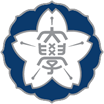Purpose of Human Resource education in the Department of Nursing
Based on the founding principles of Kyoritsu Women’s University, the purpose of human resource education in the Department of Nursing is to “nurture independent women who can create their own path to the future and autonomously participate and contribute to society by developing a well-rounded character based on a broad range of knowledge, while acquiring practical nursing skills based on the knowledge, skills, and attitude necessary for nursing specialists while also developing academic skills that will contribute to the advancement of nursing into the future and to the maintenance and promotion of people’s health.
Human Resource education Philosophy
- Cultivate a wide-ranging and in-depth education, the ability to make comprehensive judgments, and the honest and well-rounded character necessary for independent women who can contribute to all areas of society.
- Develop the ability to advocate human dignity and rights and cultivate a human-care attitude based on high ethical standards.
- Develop the ability to conduct nursing systematically and safely based on scientific evidence.
- Develop the ability to assess the health levels of individuals and families, characteristics of lifestyles, and region and health issues in order to provide high-quality nursing care.
- Develop the ability to provide support in response to various developmental stages, and the health, and psychological conditions of the subjects receiving care.
- Develop the ability to create a close relationship with a team of healthcare professionals and coordinate and cooperate with them to provide nursing care that responds to social needs and various situations.
- Develop the ability to continue to educate oneself in the future and improve expertise in nursing practice in order to serve as a nursing specialist and contribute to society.
Three Policies
Diploma Policy
Graduates are expected to have acquired the following knowledge and skills as independent women who can create their own path to the future and autonomously participate and contribute to society by developing a well-rounded character based on a broad range of learning, while acquiring practical nursing skills based on the knowledge, skills, and attitude necessary for nursing specialists, and while also developing self-education skills that will contribute to the advancement of nursing into the future and to the maintenance and promotion of people’s health.
- The wide-ranging and in-depth learning and ability to make comprehensive judgments necessary for independent women who can contribute broadly to society.
- The ability to advocate human dignity and rights, and cultivate a human care attitude based on high ethical standards.
- The ability to practice nursing systematically and safely based on scientific evidence.
- The ability to assess the health levels of individuals and families, regional and lifestyle characteristics, and health issues, so as to provide a higher quality of nursing care.
- The ability to provide support matched to the developmental stage, health, and psychological state of care recipients.
- The ability to create a close relationship with a team of healthcare specialists and coordinate and cooperate with them to provide nursing care that responds to social needs in all kinds of situations.
- The ability to continue self-education into the future and improve expertise in nursing practice, so as to fulfill the role of nursing specialist and contribute to society.
Curriculum Policy
The curriculum is designed to teach the theory and practice of care, from basic to applied knowledge necessary for understanding care recipients, assessing their health issues on an individual basis, and supporting healthy living, as well as to develop the ability to advance expertise in nursing practice.
Admission Policy
Students of the Faculty of Nursing are expected not only to have acquired adequate learning through high school but also to be equipped with the desire and drive to pursue themes on their own, and the self-motivated attitude of striving for improvement throughout their lives.
To enable them to contribute to society as nursing professionals, students are further expected to be human resources capable of acting out of empathy for and respect for the rights of others, of becoming involved actively in medical teams in a spirit of cooperation, and of showing interest in contributing to the local community in the field of healthcare.
(Subjects to be studied in high school and desirable qualifications, etc.)
- Subjects/courses it is especially desirable to study thoroughly on an everyday basis: Japanese Language and Literature, English Language and Literature
- Subjects/courses necessary for studying specialized subjects: Chemistry, Biology
- Subjects/courses useful for studying specialized subjects: Mathematics, Physics

